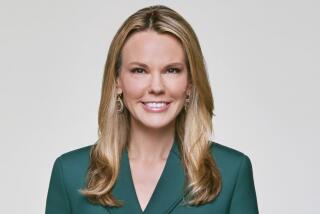CBS News President Resigns After Two Beleaguered Years
- Share via
CBS News President David Burke has resigned, ending a two-year reign as the embattled head of the troubled news division, CBS executives confirmed late Wednesday.
An announcement about Burke’s resignation could come as early as today, sources said. The network is expected to name Eric Ober, president of the CBS Television Stations division and a former CBS News senior executive, as his replacement.
Although Burke had his authority repeatedly challenged by CBS executives outside the news division, sources said his resignation was not due to differences with management on issues of budget or philosophy.
Nonetheless, Burke’s relationship with CBS Inc. Chief Executive Laurence A. Tisch was said to be increasingly antagonistic, and periodically over the last six months rumors flared of Burke’s impending resignation.
Why he chose this time to suddenly resign is unclear, but sources speculated that Burke, a former aide to ex-Gov. Hugh L. Carey of New York and Sen. Edward M. Kennedy (D-Mass.), may be planning to re-enter politics. His name has often been mentioned in connection with a possible presidential bid by New York Gov. Mario Cuomo, a good friend.
Sources did not say exactly when Burke would leave, but several people said he is expected to stay on until late September to conclude a public service campaign at CBS News that he has spearheaded. That would also give the incoming CBS News president time to participate in formulating the division’s 1991 budget.
Burke, the No. 2 executive at ABC News before being recruited almost exactly two years ago, was seen as a no-nonsense type who ended the incessant leaking to the press that had come to characterize the news division.
Nearly a decade of wrenching changes in the broadcast industry and increased competition in television news have contributed to instability within CBS News. The division has had five presidents the last seven years.
CBS News was once considered the model network news organization, but years of budget cutbacks, mass layoffs and defections have badly tarnished CBS News’ reputation.
To some extent, Burke had halted the turmoil at CBS News.
He immediately made it known after coming aboard in August, 1988, that any news division employee who was caught--indeed, even suspected--of leaking stories or making unauthorized contacts with the press would be out of a job.
And he set the example himself by turning down virtually all requests for interviews, except during official CBS News functions.
Though he helped shore up the news division’s public image, and pushed for more exhaustive coverage of news events, Burke nonetheless was considered within the CBS News organization to be a remote manager who largely delegated day-to-day operations to his chief lieutenant, Joseph Peyronnin.
One joke had it that Burke could walk through the halls of the Broadcast Center, as CBS News headquarters in New York is known, without being recognized.
Burke may best be remembered as the CBS News president who succeeded in teaching anchorman Dan Rather who was boss, CBS insiders say.
Before Burke’s arrival, Rather’s blessing was frequently needed for management changes. That changed under Burke, and some CBS insiders thought that Rather’s new status was underscored by the fact that the decision on Burke’s resignation was apparently reached while the anchorman was covering the Middle East crisis.
Under Burke, CBS News returned to a more hard-edged kind of coverage than had existed under the division’s previous two presidents--Howard Stringer, now president of CBS Broadcast Group, and Van Gordon Sauter. Still, Burke was unable to stop “CBS Evening News’ ” slide from first to second place in the ratings, or develop a new hit news program akin to CBS’s “60 Minutes” or ABC’s “Nightline.”
Eric Ober, who is expected to succeed Burke, comes into the job with two advantages that Burke did not possess. First, he has good relations with the inner circle of top CBS executives--Tisch, Stringer, Senior Vice President Jay Kriegel and CBS Entertainment President Jeff Sagansky. And, second, he is highly regarded by many inside the news division, where he was a vice president of public affairs between 1984 and 1987, overseeing such programs as “60 Minutes.”
Whether those advantages are enough to overcome the obstacles ahead remains to be seen.
Although frequently thought of as a glamorous job that entails such responsibilities as defending the First Amendment before Congress, network news division presidents today spend most of their time quelling turf wars and lobbying parsimonious corporate managers for more money to cover news.
Moreover, Ober will have to show that he can move CBS News, and particularly “CBS Evening News,” closer to first place--a difficult task, given that ABC’s “World News Tonight” has solidified its No. 1 position and, with it, the perception that ABC is the best-run network news organization.
More to Read
The biggest entertainment stories
Get our big stories about Hollywood, film, television, music, arts, culture and more right in your inbox as soon as they publish.
You may occasionally receive promotional content from the Los Angeles Times.










